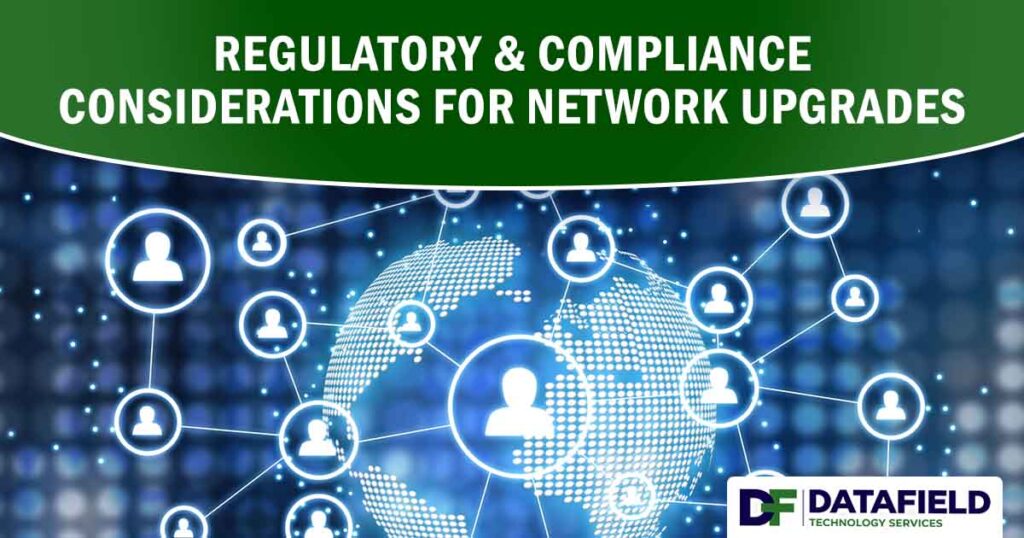Understanding Network Compliance for Upgrades
Network compliance for upgrades is a critical factor in modernizing telecom infrastructure. Businesses and municipalities must ensure their network improvements align with federal, state, and local regulations. Non-compliance can result in legal penalties, project delays, and security vulnerabilities.
Regulatory bodies like the Federal Communications Commission (FCC) establish guidelines to maintain safe, reliable, and accessible telecommunications networks. Compliance also extends to data security, accessibility, and environmental regulations. Understanding these requirements is essential for IT decision-makers, network engineers, and compliance officers managing infrastructure upgrades.
FCC Regulations and Telecom Standards for Network Upgrades
Federal Communications Commission (FCC) Guidelines
The FCC oversees network compliance for upgrades, ensuring telecom providers adhere to licensing, spectrum management, and service quality standards. Key FCC regulations include:
- Licensing & Spectrum Use – Wireless network upgrades must comply with FCC spectrum allocation rules. Unauthorized frequency of use can lead to fines and service disruptions.
- Broadband Infrastructure Deployment – The FCC’s Broadband Deployment Advisory Committee (BDAC) provides guidelines for network expansion, including rights-of-way and pole attachment regulations.
- Emergency & Public Safety Standards – Networks must support emergency communication systems, such as Enhanced 911 (E911) services and Wireless Emergency Alerts (WEA).
Telecom Safety Standards & Permitting Requirements
Network compliance for upgrades also includes adherence to safety standards and permitting laws. Businesses must follow national and local regulations to prevent operational risks and legal challenges.
- Occupational Safety and Health Administration (OSHA) Compliance – OSHA regulations mandate workplace safety during network infrastructure upgrades. This includes fall protection for tower technicians, electrical safety protocols, and proper handling of hazardous materials.
- Environmental & Historic Preservation Regulations – Network expansion may require environmental assessments under the National Environmental Policy Act (NEPA) or review under the National Historic Preservation Act (NHPA) to protect culturally significant sites.
- Local & State Permitting Processes – Municipalities regulate infrastructure deployment through zoning laws, right-of-way access, and construction permits. Compliance with these regulations ensures projects avoid delays and penalties.
Ensuring Compliance with Data Security & Accessibility Laws
Data Protection Regulations
Network upgrades must comply with data security laws to protect sensitive information. Federal and international regulations outline requirements for safeguarding consumer and business data.
- Federal Trade Commission (FTC) Guidelines – The FTC enforces data protection rules for telecom providers, requiring secure handling of personal data and transparent privacy policies.
- General Data Protection Regulation (GDPR) & Other Privacy Laws – Companies managing international data transfers must comply with GDPR, the California Consumer Privacy Act (CCPA), and other relevant privacy laws.
- Cybersecurity Measures – Network upgrades must include encryption, intrusion detection, and access control measures to prevent cyber threats. The National Institute of Standards and Technology (NIST) provides best practices for secure infrastructure.
Network Accessibility Standards
Ensuring network accessibility is a key compliance factor for telecom providers. Infrastructure upgrades must support equitable access for all users, including individuals with disabilities.
- Americans with Disabilities Act (ADA) Compliance – Telecom services must be designed to accommodate users with disabilities, including compatibility with assistive technologies.
- Universal Service Obligations – The FCC’s Universal Service Fund (USF) ensures broadband access in underserved areas, requiring compliance from service providers expanding their networks.
How DataField Ensures Regulatory Compliance for Network Upgrades
DataField provides expert guidance on network compliance for upgrades, ensuring businesses and municipalities meet all regulatory requirements.
- Regulatory Expertise – DataField stays updated on evolving FCC, OSHA, and cybersecurity regulations to help clients maintain compliance.
- Comprehensive Project Management – DataField manages compliance checkpoints to prevent regulatory violations from permitting to final inspection.
- Proven Success – DataField has helped enterprises, municipalities, and telecom providers complete network upgrades while meeting all legal and security standards.
📢 Ensure Compliance with DataField →
Navigating telecom regulations can be challenging. DataField ensures your network meets all compliance requirements—schedule a compliance consultation today!
🔗 [Ensure Compliance with DataField →]


